Produce
Nationwide Produce and Three Musketeers are donating 50p from every box of mint potatoes to support the Poppy Appeal
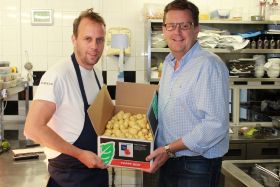
Nationwide Produce and Suffolk potato grower Three Musketeers will donate 50p to The Royal British Legion from every box of mint salad potatoes they sell during the three-week appeal.
After Edward Blanchard from Three Musketeers, and Nationwide’s Tim O’Malley, were moved by visiting Ypres, they decided to replace the mint leaf on packaging with a poppy in aid of the charity.
Backed by Michelin-starred chef Mark Poynton, the ‘Poppy Boxes’ went on sale on Wednesday 21 October at wholesalers and foodservice firms. O’Malley said: “This is a unique opportunity for buyers to support the Poppy Appeal while also backing British farming.
“We’re only five days into this promotion and the uplift in sales would already indicate that the amount we will raise for the Poppy Appeal will be closer to £15,000 than our original estimate of £10,000. The general reaction to this promotion from our customers has been very positive.”
Blanchard said it is “a great honour to help remember those that shouldn’t be forgotten” and asked the produce industry to support the initiative. “Chefs and buyers throughout the country, you can help us to raise some much-needed funds. Simply buy a product you already enjoy or swap from your usual supply and order a ‘Poppy Box’ of our Mint salad potatoes for the first time,” he said.
Darijo Srna, of Shakhtar Donetsk, has bought 20 tonnes of tangerines for children in Ukraine suffering amid scenes of war
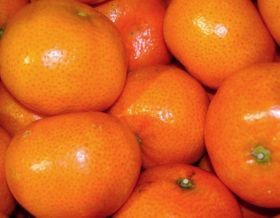
Shakhtar Donetsk’s Croatian international footballer and club captain Darijo Srna has bought 20 tonnes of tangerines for children in Ukraine, the Croatian daily Vecernji List has reported.
Srna was born in Metkovic, a region of southern Croatia well known for its tangerines. Croatia left communist Yugoslavia in 1991 and then fought a four-year war of independence.
“I grew up in Croatia so I also went through a period when I needed help. Donetsk has helped me a lot and this is just a small gift with which I want to pay them back,’ the daily newspaper quoted the 32-year-old as saying.
The Ukrainian top-flight side said on its website: “The lorries carrying the fruit bought in Darijo’s hometown Metkovi have already arrived in Donetsk.”
The tangerines will be distributed to at least 20,000 local children with a special greeting card for every child, the club statement said.
Vegetable supplier forms ‘strategic alliance’ with Lincolnshire Field Products to secure land bank for brassicas
Vegetable giant Produce World has joined with Lincolnshire Field Products (LFP) to form one of its largest growing partners for brassicas for the 2015 harvest.
The company will now work in partnership with LFP and a number of existing key growers.
“The Produce World Group is a growing business with ambitious plans over the next five years. We are reviewing our strategies across the Group including procurement,” said procurement director, Jon Campbell. “In this sector there was an opportunity to work with LFP, which is one of the country’s leading brassica growers. We are delighted to add its experience and expertise to that of our other key growers.”
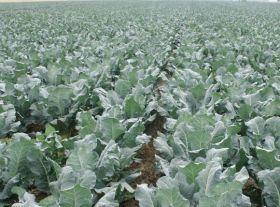
Campbell said it is “critical” to secure a land bank for brassicas, which is facing tough competition from other crops in terms of pressure on land and consolidation in the industry.
“We feel this is an important move for the future of brassica growing in Lincolnshire, and will best meet the needs of our customers in the future.
“LFP are at the cutting-edge of agronomy in this sector. Their considerable experience and expertise enables them to deliver the brassica crop in an accurate and timely manner,” he said.
Martin Tate, commercial director for LFP, said: “We are looking forward to working closely with the team at Produce World and meeting the needs of its customers in 2015. We feel that there are considerable synergies between our two organisations, particularly as Produce World is a company with farming at its heart.”
Produce World also grows potatoes and onions through its farming division Burgess Farms, as well as through partnerships with grower groups including Taylor Grown, Tompsett Burgess Growers and Greenshoots.
In July the company bought Scottish root vegetable specialists This is Organics (TIO) for an undisclosed sum, which it said would secure the future of organic land and expertise of Scottish growers.
While Israel’s military bombardment of Gaza continues, Hamas’s rocket fire is pushing up prices of fruit and vegetables in Israel, as workers flee.
Israel’s recent and ongoing military assault on the Gaza Strip has once again brought death and destruction to what many commentators were already coining the world’s largest open-air prison.
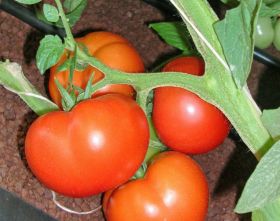
According to Israeli officials, the campaign has been implemented to halt the rocket fire into Israel by Hamas, the organisation that governs Gaza and is labelled a terrorist group by many countries, including Israel, the US, the EU and Japan, although many nations, such as China, Russia, Iran and much of the Arab world, do not.
A report in Globes stated that the rocket fire had led to a jump in prices of certain fruit and vegetables in Israel due to irregular harvesting, as some farmers refuse to work in such conditions.
Wholesale tomato prices have risen by 47 per cent to ILS 6.5-6.8 (€1.40) per kilogram, melons by more than 180% to ILS 5.6-6 (€1.20-€1.30) per kilo.
Cauliflower prices have increased by 130% to ILS 7.6-8 (€1.64-€1.73) per kilogram, while cabbages are up by 46%.
Aharon Bitton, a farmer from Kibbutz Erez, commented: “The workers don’t want to work. The Thai, Bedouin, and Sudanese workers are all fleeing out of fear.”
Farmers from the Ein Yahav-based Yofi Shel Yerakot (Beauty of Vegetables) Cooperative told the Jerusalem Post that vegetables that had not been harvested in time and were therefore over-ripe may have to be sold to the Palestinian vegetable market in the West Bank.
Critics of the latest Israeli attacks argue that these actions stand no hope of bringing peace since they do not address the continuing illegal occupation of Palestinian territory by Israel, nor its illegal blockade on Gaza.
Welsh grower Perkin Evans wants the NFU to keep lobbying Brussels to ensure food producers’ tool-boxes aren’t ‘depleted’
Farmers fear Europe is fast becoming an over-regulated environment to operate within, NFU Wales has found.
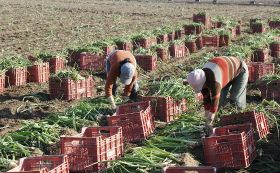
A new campaign by the union, called ‘Healthy Harvest’, has just been launched in response to concerns that already flat-lining UK crop production will go into further decline if Welsh farmers continue to lose access to key plant protection products.
Statistics show that since 2001, half the plant protection products on the market have been lost, and over the next five years, half of what is left could also disappear from the market owing to overzealous regulation, not backed up by sound science.
“Our toolbox as food producers is becoming increasingly depleted, at the very time we need to be stepping up to the challenge of producing more,” said Perkin Evans, chairman of NFU Wales’s Combinable Crops and Horticulture Working Group at the group’s recent meeting.
He added: “Europe is fast becoming an over-regulated environment for farmers to operate within. We are steadily losing our markets to farmers elsewhere in the world, who have better access to more effective means of crop protection and production.
“With global demand for food heading in only one direction, now is certainly not the time to be taking away the tools that we need to be able to produce disease free, high yielding crops, and we need the same access to safe technology as our competitors if we are to have a productive and competitive sector.
“As more and more products get withdrawn, there is simply not the corresponding level of new products arriving on the market to replace them, and the reality is that European requirements to bring a new product to market have become prohibitively expensive and time consuming, leaving farmers and growers with fewer and fewer products to choose from. To make things worse, many manufacturers are decreasing investment in the European market, partly because it is over-regulated.”
Evans believes that as a union, NFU Wales needs to keep lobbying to ensure that both EU and domestic regulators base the control of plant protection products on sound science; something that includes lobbying the EU to move away from its current hazard based approach, and return to a risk-based process.
Many of those quizzed were unaware that they can buy British strawberries in the summer months, and homegrown Brussels sprouts in December.
When it comes to eating ‘in season’, British consumers have little idea when they can buy UK-grown fruit and vegetables, a new survey has revealed.
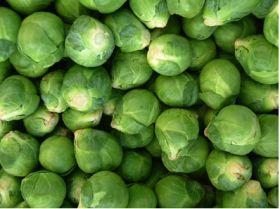
The survey, carried out by LEAF (Linking Environment and Farming) ahead of this weekend’s Open Farm Sunday event, also found that many consumers didn’t know that British farmers grow foods such as blueberries (63%), sweetcorn (62%), iceberg lettuce (37%), cauliflower (29%), carrots (21%), aubergines (19%), or even apples (19%).
And, despite the fruit’s strong association with Wimbledon, less than six in ten adults knew that they can buy British strawberries in the summer. Some 5,000ha of British strawberries are grown commercially each year, yet one in five people questioned by LEAF didn’t realise that UK farmers grew them at all.
While the exact start date of the season varies depending on the weather, the fact that the British asparagus season runs from April until June has also passed many consumers by, if the LEAF survey is anything to go by.
Only one in three people questioned knew when they could buy British asparagus, with one in ten thinking they could buy it all year round.
Winter produce fared no better, with nearly half of consumers (46 per cent) unaware that in December, you can buy British-produced Brussels sprouts.
It also appears that things are getting worse, with the research showing that those born in the 1990s have significantly less knowledge than previous generations.
LEAF’s survey found that if you were born in the 1990s rather than the 1950s, you were:
· 1.5 times less likely to know British farmers grew strawberries;
· 2.5 times less likely to know you could buy British Brussels sprouts in December;
· Three times less likely to know when to buy British asparagus;
· Twice as likely to not know that iceberg lettuce is grown on British farms;
· And 2.5 times less likely to know you can buy homegrown red cabbage (30% compared with 74%)
Many adults born in the 1990s also thought that Britain commercially grows oranges (16%), bananas (8%), and kiwi fruits and mangoes (both 5%).
Meanwhile, large numbers did not know that the UK grows cauliflower (55%), apples (35%) or carrots (39%).
And, only four in ten of those questioned understood that buying seasonally supported British farmers.
Annabel Shackleton, LEAF’s Open Farm Sunday manager, said: “Alarmingly there appears to be a decline in knowledge about what UK farmers grow and when to buy homegrown produce. A number of initiatives are being run in schools to help improve children’s knowledge but it seems adults could do with some lessons too.
“One in ten people questioned admitted to having been left embarrassed by asking for something that wasn’t in season, but much greater numbers than that have a problem understanding seasonality. The agricultural industry is worth billions to the British economy, so it is important that we know what homegrown produce to look out for when shopping.
“Talking to a farmer is a great way to discover more about your food, so we’d encourage as many people as possible to visit their local farm on Open Farm Sunday, 8 June, where nearly 400 farms of all types and sizes will be opening their gates for visitors to celebrate British farming and food.”
LEAF is an organisation dedicated to delivering more sustainable food and farming, and has run Open Farm Sunday since 2006.
Its survey of 2,000 adults was carried out by One Poll during May 2014.